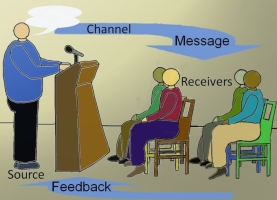 Great leaders know how to focus on the positive, helpful, edifying and uplifting communication while managing the negative, destructive, decisive and demeaning communication in meetings.
Great leaders know how to focus on the positive, helpful, edifying and uplifting communication while managing the negative, destructive, decisive and demeaning communication in meetings.
Consider this advice from a seasoned old-timer to a young leader who was still early in his leadership career. It happens to be from the New Testament of the Bible.
“But avoid foolish controversies and genealogies and arguments and quarrels about the law, because these are unprofitable and useless. Warn a divisive person once, and then warn them a second time. After that, have nothing to do with them.”
Titus 3:9-10
Have you ever been in a meeting that digressed and evolved into almost a free-for-all? As a contrast, have you ever been in a team meeting where the leader encouraged good debates and successfully squashed useless ones?
 Such well-managed teams tend to finish their meetings with good plans and they do it on time. The participants feel productive and actually like getting together because everyone feels like they were a part of something productive.
Such well-managed teams tend to finish their meetings with good plans and they do it on time. The participants feel productive and actually like getting together because everyone feels like they were a part of something productive.
But, back to my brief Biblical text. The Apostle Paul (the old-timer) exhorted a pastor (young leader) named Titus to refrain from arguing about peripheral subjects that divided his followers. And I think that advice is relevant to leadership principles today.
There is a branch of modern communication theory that seems to have grown out of the apostle Paul’s philosophy. In 1968, Sir Charles Geoffrey Vickers, an English lawyer, administrator, writer, and pioneering systems scientist introduced the concept of “appreciative systems”, which later became Appreciative Inquiry (AI). It was really further developed nearly 20 years later at Case Western Reserve University’s department of Organizational Behavior. It started there with an article in 1987 by David Cooperrider and Suresh Srivastva. They felt that the overuse of “problem solving” as a model often held back analysis and understanding, focusing on problems and limiting discussion of new organizational models. At its core, AI is positive debate that explores what an organization does well and how it can build on its strengths.
 As leaders it’s sometimes difficult to limit discussion and keep debates from getting out of control.
As leaders it’s sometimes difficult to limit discussion and keep debates from getting out of control.
Click here to read the rest of the article »
Caring is sharing. Will you please share this with your network?
 Leadership is involving is the third in this short series. In case you have missed the first two, here are links to those articles. The first one was Leadership is . . . Modeling. And the second one was Leadership is . . . Teaching. But today I want to focus on involving others through our leadership.
Leadership is involving is the third in this short series. In case you have missed the first two, here are links to those articles. The first one was Leadership is . . . Modeling. And the second one was Leadership is . . . Teaching. But today I want to focus on involving others through our leadership. Even if you have the leverage of certain extrinsic motivators,
Even if you have the leverage of certain extrinsic motivators, 












